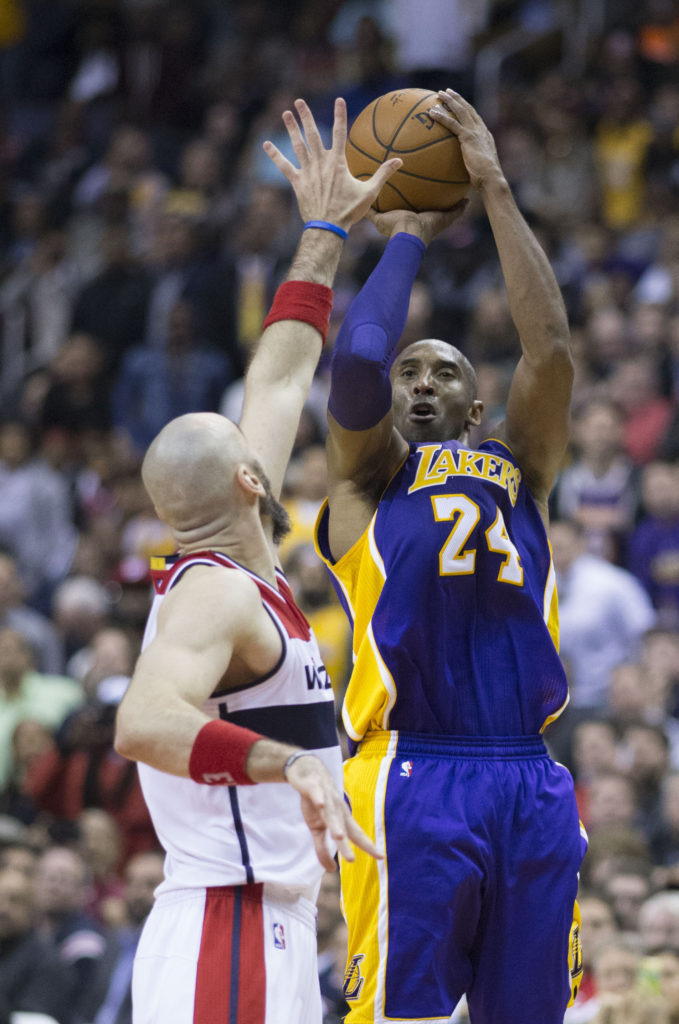
On Sunday, January 26, former Los Angeles Lakers star player and all-around basketball legend Kobe Bryant (41) tragically perished in a helicopter crash in California, along with his second-eldest daughter Gianna (“Gigi”) (13) and seven other individuals aboard the aircraft. Infamous tabloid TMZ broke the news on their website,[1] a move that was quickly scolded by Los Angeles County Sheriff Alex Villanueva who slammed the tabloid’s lack of respect in choosing to publish the sensitive information seemingly prior to law enforcement having contacted Bryant’s family.[2] As Villaneuva put it, “It would be extremely disrespectful to understand that your loved one . . . perished and you learn about it from TMZ . . . [t]hat is just wholly inappropriate.”[3]
Outraged fans took to Twitter and other social media outlets to express their disgust with the outlet’s move, suggesting that Bryant’s wife, Vanessa, or other family members should seek legal action.[4] TMZ’s founder, Harvey Levin, has since rebutted the claims that Bryant’s family was not notified prior to publication, asserting that, rather, the family had received the unfortunate news and his team gave the go-ahead on the story release.[5] While the facts will likely remain disputed and the early publication of such devastating news stands as disrespectful, there seems to be little recourse available to family members of victims under the current legal framework against a news outlet who makes the decision to publish this information.
While the word “defamation” was quickly tossed around following the breaking news, there are a limited number of circumstances in which such recourse would apply. First, the Restatement (Second) of Torts tells us that “to create liability for defamation there must be: (a) a false and defamatory statement concerning another; (b) an unprivileged publication to a third party; (c) fault amounting at least to negligence on the part of the publisher; and (d) [. . .] harm caused by the publication.”[6] Next, just because those requirements are met, doesn’t necessarily mean that a party will be held liable.
As known by many, the First Amendment of the United States Constitution protects the freedom of speech and freedom of the press.[7] In the 1964 landmark case of New York Times v. Sullivan, the Supreme Court held that the First Amendment protects potentially defamatory published statements regarding the conduct of public officials, unless those statements were made with actual malice.[8] Actual malice requires that the defendant acted with “knowledge that [the statement] was false or with reckless disregard of whether it was false or not.”[9] Just a few years later in Curtis Publishing v. Butts, the Court extended N.Y. Times to hold that “public figures,” such as celebrities and athletes, “may also recover damages for a defamatory falsehood whose substance makes substantial danger to reputation apparent, on a showing of highly unreasonable conduct constituting an extreme departure from the standards of investigation and reporting ordinarily adhered to by responsible publishers.”[10]
In light of this standard, while the late Bryant certainly fits the bill for a public figure, it would likely be difficult for his family to prove that the published information harmed his reputation, as the information reported was not a falsehood. Further, while there might be an argument that being the first to break this news constitutes highly unreasonable conduct (as considered by a reasonable person), especially if it could be shown that the family had not been previously notified, these actions certainly do not constitute an unreasonable departure from the standards of reporting that TMZ ordinarily adheres to: the quick reporting of Bryant’s death was not a new tactic employed by TMZ but rather a tried and true technique that the outlet has come to be known for. Well-put by the New York Times in a 2009 piece following the death of popstar Michael Jackson:
TMZ, the carnivorous celebrity news Web site, is accustomed to beating other media outlets on the stories that shape the entertainment world. On Thursday, it not only scooped every other outlet by announcing Michael Jackson’s death, it apparently beat the coroner’s office, too by six minutes.[11]
TMZ was also reportedly the first outlet to break the news of the death of both Prince and Whitney Houston, as well.[12] While tabloids such as TMZ may be widely frowned upon by society, “the heightened standards and protections are worth the potential problems in order to allow free speech to flourish.”[13] A fundamental issue in the N.Y. Times case, Justice Brennan described that “erroneous statement is inevitable in free debate, and that it must be protected if the freedoms of expression are to have the ‘breathing space’ that they ‘need . . . to survive[.]’”[14] And finally, even in light of the aforementioned analysis, the Bryant family would be unable to proceed with a defamation claim on the grounds that “the defense of truth is constitutionally required when the subject of the alleged defamation is a public figure.”[15] In light of the likely finding that Bryant was a public figure and the reporting on his death was not false, TMZ would prevail in using truth as a defense.
Since a defamation claim is not viable, the Bryant family might consider alternative methods to recover for the hardship suffered in the wake of the loss of Kobe and Gigi. In the 1971 case of Branzburg v. Hayes, the Supreme Court held that requiring a reporter to testify before a grand jury does not violate their freedoms of speech and press.[16] Branzburg had investigated and published an article on various drug crimes that took place in Kentucky. He was called in to testify before a grand jury and refused, arguing that he was permitted to keep his sources confidential under the theory of reporter’s privilege. The Supreme Court was quick to point out that “[t]he privilege claimed [. . .] is conditional, not absolute,”[17] and that “the public interest in law enforcement and in ensuring effective grand jury proceedings”[18] outweighed the undue burden that might be placed on the gathering of information for news reporting. This limitation on the reporter’s privilege has been subsequently acknowledged by the Supreme Court,[19] the Fourth Circuit,[20] the Eastern District of Virginia,[21] and more.
Applying this to the Bryant case, it is unclear how TMZ received their inside scoop prior to law enforcement releasing this information to the public, but we can surmise that there may have been a leak from within the department or by someone else with privileged information. If an investigation were to be done into the source of this leak and ultimately there was prosecution, providing that the release of this confidential information was in violation of the Los Angeles Police Department Manual, it is plausible that Harvey Levin or another higher up at TMZ could be called to testify and required to release the name of their source should the Court weigh the interests and find the disclosure weighing in favor of maintaining effective law enforcement measures. The Bryant family might then be able to bring a civil suit against the individual who broke protocol, and perhaps more importantly, this might work to create a chilling effect to silence individuals from handing this information over to TMZ in the future.
Additionally, while a handful of states have implemented “shield laws”[22] that presumably go against the Branzburg line of cases, we might consider writing an exception to such laws that would produce more equitable results by creating a chilling effect on those looking to reveal private or sensitive information.
While the facts of the way in which these events unfolded, including the order in which individuals were notified, have not been made public, we might consider the unfair-if-true timeline of events above and use this to finally call for change in the law surrounding tabloids’ permission to publish sensitive information in a manner that will not stifle free speech and freedom of the press. The law as is stands does not seem to provide likely recourse for families who fall victim to the unfortunate situation in which their loved one is a public figure and subject to untimely reporting on the circumstances surrounding their death, and we can argue that these seemingly immoral results are not the outcome that we would intend on. Finally, it is important to note that only a very narrow scope of the overall incident has been considered here: recovery for the announcement of the death of Kobe Bryant himself. There might be other avenues to consider, including recourse for inaccurate statements made by other news outlets in the wake of the crash.
Dylan Reich is a second-year law student at Cardozo School of Law where she is a Staff Editor for the Cardozo Arts & Entertainment Law Journal. Dylan also serves as a copyright chair on the Intellectual Property Law Society executive board and an events chair on the Entertainment Law Society executive board. Dylan is currently interning at Cowan, DeBaets, Abrahams & Sheppard LLP, has previously interned at Universal Music Group and Sony Music Entertainment in the Business & Legal Affairs Departments, and she is particularly interested in Entertainment Law.
[1] See KOBE BRYANT, DAUGHTER GIGI DIED IN HELICOPTER CRASH…3 Bodies Recovered, TMZ (Jan. 26, 2020, 2:24 PM), https://www.tmz.com/2020/01/26/kobe-bryant-killed-dead-helicopter-crash-in-calabasas.
[2] Oliver Darcy, Police scold TMZ after outlet was first to report death of Kobe Bryant, CNN Business (Jan. 26, 2020, 9:33 PM), https://www.cnn.com/2020/01/26/media/tmz-death-report-kobe-bryant/index.html.
[3] Id.
[4] See @itskeyon, Twitter (Jan. 26, 2020, 6:07 PM), https://twitter.com/itskeyon/status/1221570320232042497; See also @iHeartyLanz, Twitter (Jan. 27, 2020, 1:33 PM), https://twitter.com/iHeartLanz/status/1221863827463118851.
[5] Tamar Lapin, TMZ head Harvey Levin claims ‘Kobe’s people’ gave approval to publish crash story, N.Y. Post (Jan. 28, 2020, 10:37 PM), https://nypost.com/2020/01/28/tmz-head-harvey-levin-claims-kobes-people-gave-approval-to-publish-crash-story/.
[6] Restatement (Second) of Torts § 558 (Am. Law Inst. 1977).
[7] U.S. Const. amend. I.
[8] N.Y. Times Co. v. Sullivan, 376 U.S. 254 (1964).
[9] Id. at 280.
[10] Curtis Pub. Co. v. Butts, 388 U.S. 130, 155 (1967).
[11] Brian Stelter, TMZ Was Far Ahead in Reporting Death, N.Y. Times (June 26, 2009), https://www.nytimes.com/2009/06/27/business/media/27media.html.
[12] Darcy, supra note 2.
[13] Victoria Cioppettini, Modern Difficulties In Resolving Old Problems: Does The Actual Malice Standard Apply To Celebrity Gossip Blogs?, 19 Seton Hall J. Sports & Ent. L. 221, 250 (2009) (discussing the challenges of weighing the protection of free speech against the permissions of publishing harmful and damaging information).
[14] N.Y. Times Co. v. Sullivan, 376 U.S. 254, 271-72 (1964).
[15] Cox Broad. Corp. v. Cohn, 95 S. Ct. 1029, 1048 (1975).
[16] Branzburg v. Hayes, 408 U.S. 665 (1972).
[17] Id. at 702.
[18] Id. at 689.
[19] See Bartnicki v. Vopper, 121 S. Ct. 1753, 1764 n.19 (2001) (holding that government interests in minimizing harm to persons whose conversations had been illegally intercepted did not justify a restraint on free speech, but noting that the holding“does not apply to punishing parties for obtaining the relevant information unlawfully.”).
[20] United States v. Steelhammer, 539 F.2d 373, 375 (4th Cir. 1976) (finding that Branzburg “does not accord a privilege, absolute or qualified, to the reporter.”).
[21] United States v. King, 194 F.R.D. 569, 585 (E.D. Va. 2000) (finding that defendants must turn over an interview with a co-conspirator because “the compelling law enforcement interest overrides the interest of the press. . .”).
[22] See e.g., N.Y. Civ. Rights L. § 79-h (2019); see also Cal. Const, Art. I § 2.



